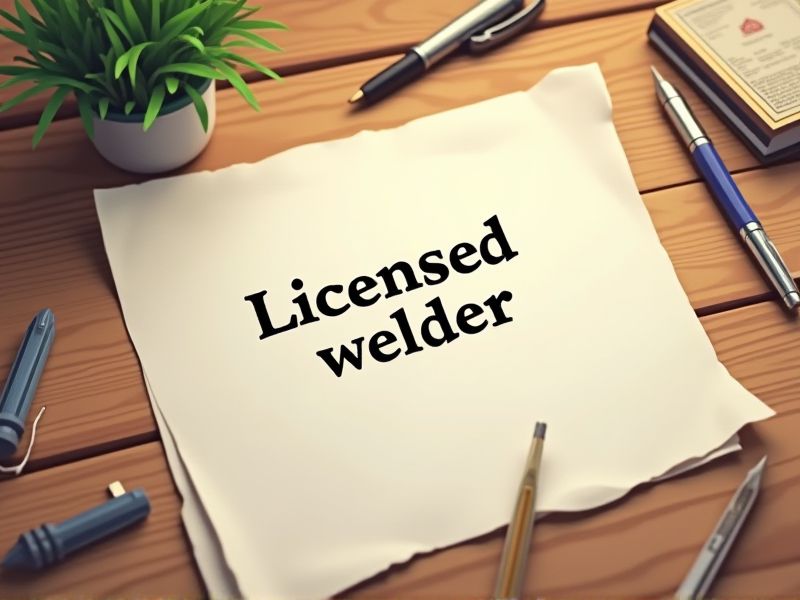
Licensed welders require specific certifications to ensure they meet industry standards and safety regulations. These certifications validate the welder's skills in various techniques and materials, which are crucial given the potential hazards associated with welding. Employers in sectors like construction and manufacturing often demand certified welders to minimize risks and ensure the integrity of the work. Key certifications a licensed welder may need include AWS Certified Welder, Certified Welding Inspector, and specific state or industry certifications.
AWS Certified Welder
An AWS Certified Welder demonstrates proficiency in specific welding procedures, which directly increases their employability in industries that require adherence to strict standards. Industries like construction, manufacturing, and automotive recognize AWS certification as a benchmark for quality, thus a licensed welder with this certification often has access to a wider job market. AWS certification ensures consistent skill validation, increasing reliability and trust in the welder's capabilities from employers and clients. Certification often leads to higher earning potential, as it signals to employers a verified level of skill and dedication to the craft.
Certified Welding Inspector (CWI)
The presence of a Certified Welding Inspector (CWI) ensures adherence to industry standards and regulations, thus enhancing safety and quality. By employing a CWI, a licensed welder's work meets the requisite specifications, reducing the likelihood of defects and failures. CWIs provide objective assessments and validations that often improve the credibility of welding operations, which is essential for project approval and stakeholder trust. Their expertise assists in early detection of potential issues, leading to reduced repair costs and project delays.
AWS D1.1 Structural Welding Certification
The AWS D1.1 Structural Welding Certification ensures that a welder possesses the skills required to perform high-quality welds, adhering to industry standards. When a welder holds this certification, employers gain confidence in their ability to work on structural projects where safety and durability are paramount. This certification often becomes a prerequisite for employment on significant construction projects, where structural integrity is non-negotiable. Increasing demand for certified welders in infrastructure and construction sectors reflects the industry's trust in standardized credentials for quality assurance.
ASME Section IX Welding Certification
ASME Section IX Welding Certification ensures a welder's competence in meeting specific industry standards, crucial for maintaining safety and quality. This certification boosts a welder's credibility and employability in industries where precision and compliance are non-negotiable. Regulatory bodies and insurance companies often require this certification as proof of proficiency and adherence to established welding codes. Holding ASME Section IX certification differentiates licensed welders in competitive markets, opening up opportunities in specialized fields.
API 1104 Pipeline Welding Certification
The API 1104 Pipeline Welding Certification is necessary for licensed welders because it establishes a standardized skill set recognized globally in the pipeline industry. It enhances a welder's credibility and ensures compliance with industry standards for safety and quality. Companies often require this certification to minimize risks associated with pipeline failure. Obtaining this certification can lead to better job opportunities and higher earning potential due to increased trust in the welder's capabilities.
NDT Level II Certification in Radiographic Testing (RT)
Obtaining NDT Level II Certification in Radiographic Testing (RT) ensures that a licensed welder can accurately detect and interpret flaws in welded joints, enhancing safety and structural integrity. This certification is crucial because it reduces the risk of undetected defects that could lead to costly failures or repairs. Skilled interpretation of radiographic images aids in maintaining compliance with industry standards and regulations, which is vital for project acceptance. Employers often require this certification as it demonstrates a welder's commitment to quality control and technical proficiency.
NDT Level II Certification in Ultrasonic Testing (UT)
Licensed welders often require NDT Level II Certification in Ultrasonic Testing because it enhances their ability to detect subsurface defects, ensuring weld integrity. Advanced skill in ultrasonic testing directly correlates to elevated quality control and safety standards in various industries. This certification opens up additional employment opportunities, as employers prefer candidates capable of comprehensive inspection methods. The certification also optimizes workflow efficiency by reducing the need for rework or repairs, which saves time and cost.
OSHA 30-Hour Construction Safety Certification
The OSHA 30-Hour Construction Safety Certification provides welders with comprehensive knowledge on workplace safety practices, directly reducing the risk of job-related accidents. Exposure to this program enhances a welder's understanding of OSHA regulations, fostering compliance and reducing potential fines for employers. Completing this certification equips welders with the skills to identify hazards, leading to a safer work environment. The demand for certified professionals by employers prioritizing workplace safety increases job opportunities for licensed welders.
TWI Certified Welding Supervisor
A TWI Certified Welding Supervisor enhances a licensed welder's performance by providing specialized oversight and guidance, ensuring adherence to industry standards. This role is crucial in reducing welding defects and improving overall project quality by implementing best practices. Data shows that supervision curtails unnecessary weld repairs, directly cutting down project costs and increasing efficiency. Welding supervisors further reinforce safety protocols, contributing to safer work environments and minimizing potential accidents.
AWS Certified Welding Educator (AWE) Certification
The AWS Certified Welding Educator (AWE) Certification enhances a welder's ability to effectively teach and train others in welding best practices, crucial for maintaining high industry standards. Industries recognize certification as a mark of expertise, leading to increased opportunities for career advancement and professional recognition. Certified educators bridge the gap between theoretical knowledge and practical application, ensuring that welders are well-versed in safety protocols and advanced techniques. Moreover, companies prioritize certified educators to reduce operational risks and improve overall productivity through better-trained personnel.
Summary
When you obtain additional certifications as a licensed welder, your marketability in the job market increases significantly. Employers tend to prioritize candidates with specialized skills, potentially leading to more job offers and higher earnings. The certifications demonstrate your commitment to professional growth, which can enhance your reputation and credibility in the industry. Moreover, acquiring these credentials can open up opportunities for more complex and challenging projects.
